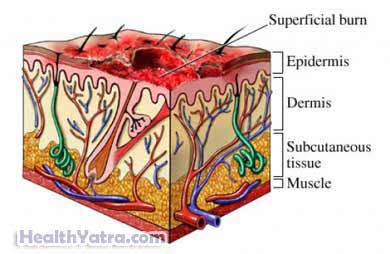Definition
Sunburn is the term for red, sometimes swollen and painful skin. Sunburn can vary from mild to severe. The extent depends on your skin type and the amount of exposure to the sun. Sunburn is a serious risk factor for skin cancer and for sun damage.

Causes
Sunburn is caused by overexposure to UV rays from the sun.
Risk Factors
Factors that increase your chance of sunburn include:
- Being exposed to the sun
- Having light skin color
- Taking certain medicines that may increase your sensitivity to the sun (such as, antibiotics, diuretics, birth control pills)
- Living in certain areas (such as, southern United States)
Symptoms
The symptoms of sunburn vary from person to person. You may not notice redness of the skin for several hours after the burn has begun. Peak redness will take 12-24 hours.
Symptoms can include:
- Redness
- Swelling
- Warmth
- Pain
- Blisters
- Fever
- Chills
- Weakness
When to Call Your Doctor
A mild sunburn does not often require a visit to the doctor.
See your doctor if you have a severe burn or if your burn symptoms are not improving after a few days
Call if you have:
- Large areas of blistering
- Fever
- Extreme pain
- Headache or confusion
- Dizziness or vision changes
- Severe swelling
- Signs of infection, such as:
- Having open blisters that are draining pus
- Having areas of redness or red streaks spreading or moving away from open blisters
Diagnosis
The doctor will ask about your symptoms and medical history, and perform a physical exam. For more severe cases of sun damage, you may be referred to a doctor who specializes in skin disorders.
Treatment
Treatment depends on the severity of the sunburn. The first and most important step in treatment involves getting out of the sun at the first sign of redness or tingling. Stay out of the sun until the skin is fully healed. This may take several weeks.
In addition, you can do the following:
- Apply a cool compress to soothe raw, hot skin.
- Take over-the-counter pain reliever if recommended by your doctor.
- Take oral or topical corticosteroids if recommended by your doctor. These may shorten the course of pain and inflammation. Topical steroids may not relieve skin redness.
- Take prescription antibiotics if an infection develops.
- Be extra careful to protect skin after it peels. The skin is very sensitive after peeling.
Prevention
To prevent sunburn, you must shield your skin from the sun’s rays.
- Avoid strong, direct sunlight.
- Plan outdoor activities early or late in the day to avoid peak sunlight hours between 10:00 AM and 4:00 PM.
- Choose a sunscreen, sunblock, or special sunblock clothes with a sun protection factor (SPF) of at least 15. It should filter out both UVA and UVB rays.
- Apply sunscreen liberally, thoroughly, and frequently to all exposed skin. Do not forget your lips.
- Wear protective, tightly woven clothing, as well as a broad-rimmed hat and sunglasses.
Keep in mind that water is not a good filter. You can become sunburned while swimming or snorkeling. You can also become sunburned during the winter and on cloudy or foggy days.
